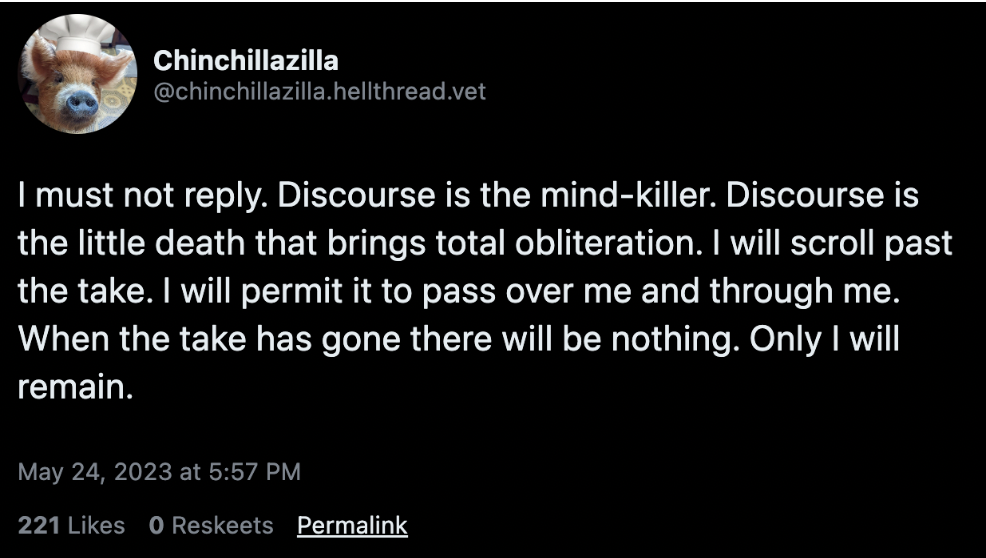
The moments in literature we DEFY ChatGPT to compute.
Every day I see another article framed around a journalist feeding something into ChatGPT and publishing the results, or an author writing 87 books with AI in a single day, or a publishing house using LMM to sort the slush pile, another bone dissolves within my body. Soon, I shall be but a disappointed beanbag with an MA in English literature, let down by my STEM counterparts who have unleashed the AI discourse and degradation of pay upon us.
But hark, I see a glimmer of hope. For all that machine learning can achieve, I simply don’t think it has a shot at computing literature, which after all drives extremely niche experts who spend their entire lives studying one tiny facet to debate the meaning of a single word or phrase unto eternity. Really good writing has a hard shell that no Google spider can get its feet under, and a knack for subverting meaning by turning words upside down. As fast as Dictionary.com learns the supposed meaning, language is building itself into an elaborate stairway in a different direction. It is a battle of scythes against magnetic poetry tiles.
Case in point, the below moments in literature, which even humans struggle to wrap their complex neural pathways around.
*
“Kill Claudio”
Beatrice utters these words to her beau Benedick at a crucial moment in Much Ado About Nothing when everyone believes Hero has died of shame (thanks a lot, Claudio!). Is it funny or serious? A romantic challenge or sad trombone? A lack of stage directions complicate decisions about how exactly to play the moment. Ha ha?
))<>((
In Miranda July’s Me and You and Everyone We Know, this translates to “You poop into my butthole, I poop into yours. Back and forth. Forever.” It’s a computer chat between a single woman in her 30s and a 6-year-old boy, and look I simply do not give computers credit for being able to fully understand what July is doing at a given moment, nor to decode an emoji built out of four parenthetheses and a less than and greater than symbol.
Is Satan the real hero of Paradise Lost?
Dear AI-bot, explain to me exactly what “rising foulds, that tourd/fould about fould a surging Maze” means (and how it is pronounced), and how it impacts the thesis that Milton was championing Satan and his slippery tongue in Paradise Lost? Do it, I dare you!
“What is your understanding of what ‘death recorded’ means?”
Cast your mind back to the moment several internet years ago when Naomi Wolf, while being interviewed about her new book Outrages, was asked by BBC broadcaster Matthew Sweet what “death recorded” meant. Wolf’s book hinged on the outrage of executing men charged with sodomy, which was based on the wrong assumption that “death recorded” meant that they had indeed been executed. Unfortunately, she had that brick upside-down: “death recorded” was shorthand for a pardon.
keeping track of things with the following rhyme:
if the Naomi be Klein
you’re doing just fine
If the Naomi be Wolf
Oh, buddy. Ooooof.— bela lugosi's dad (@markpopham) October 23, 2019
“Does this cover show ecstasy or pain?”

A computer cannot answer it!
“Does Othello have a race problem?”
I watched this debate hosted by the Royal Shakespeare Company on the topic (there are many), and after a deep and ponderous conversation lasting 13+ minutes, was lulled into a relaxed state but didn’t have a solid answer beyond “perhaps by omission,” because the answer is a web of textual remnants and historical facts that crisscross into something that adds up to a greater appreciation, but not a hard Google answer box.
On Smarm
Given a good chunk of the online population failed to compute “On Smarm,” which explained exactly what its position was, but required a tonal adjudication on the part of the reader to process the argument, I think you might actually send a hard drive spinning off its circuit board were you to plug in Tom Scocca’s citation of Harry Frankfurt:
The fact about himself that the bullshitter hides … is that the truth-values of his statements are of no central interest to him; what we are not to understand is that his intention is neither to report the truth nor to conceal it.
ERROR VALUE=?
“Can art help us to face our imminent demise?”
One thing about computers is they never have to die (unless they’re an Apple product). Humans, on the other hand, have turned to art since the time before Cliffs Notes to process and respond to their mortality. So have literary greats like Joyce Carol Oates, whose deft way with language could never be replicated by a series of 0s and 1s.
(you can always recognize a place in which no one is feeling much or any grief for a lost loved one & death, dying, & everyone you love decomposing to bones is just a joke.) https://t.co/1OuMqgw550
— Joyce Carol Oates (@JoyceCarolOates) October 1, 2021
“Is Eileen the most unlikeable character in fiction?”
Internet churn depends in no small part on perennial debates like “Is X the most unlikeable character?” Ottessa Moshfegh has been a good sport about participating in such discussions around her work, keeping the lights on at The New Statesman and elsewhere. But will the AI bots have the wits about them to find tiny hooks to lure readers?
Pointless literary debates
I simply don’t know how the computers will be able to manufacture genuinely brain-melting discourse at the level of an online human.

Janet Manley
Janet Manley is a contributing editor at Literary Hub, and a very serious mind indeed. Get her newsletter here.



















